University Research Proposal: Direct Hotel Booking Marketing
VerifiedAdded on 2020/05/04
|21
|4380
|99
Report
AI Summary
This research proposal examines the shift towards direct online hotel booking, analyzing its advantages and disadvantages for the hospitality industry. The study investigates customer preferences, the influence of online travel agencies, and the benefits of direct booking for hotels. It reviews existing literature, identifies research gaps, and formulates research questions and objectives. The proposal outlines a mixed-method research design, including data collection and analysis strategies, to assess the impact of direct booking on business promotion and customer acquisition. The research aims to provide insights into the evolving landscape of hotel marketing and distribution, considering the role of technology and customer behavior in shaping the industry.
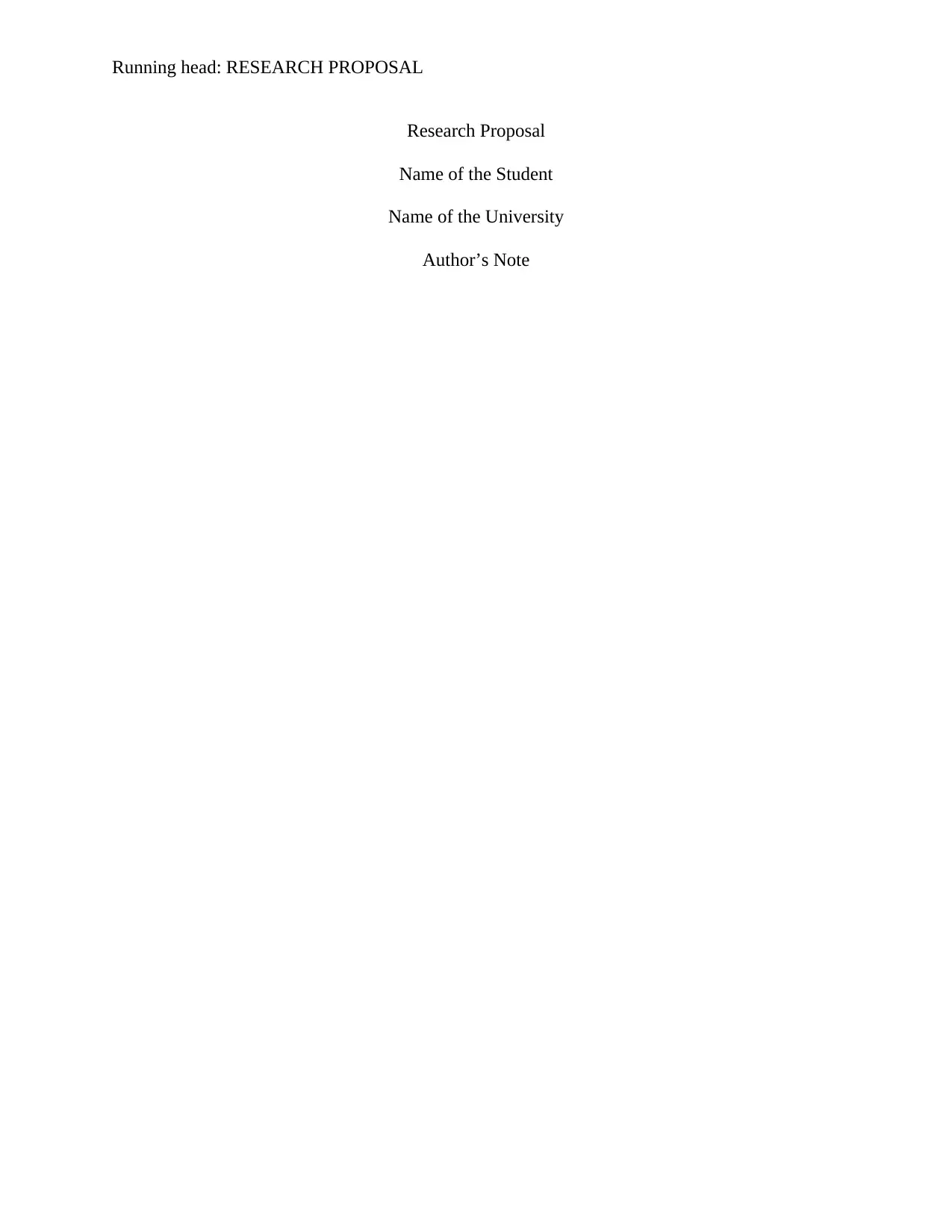
Running head: RESEARCH PROPOSAL
Research Proposal
Name of the Student
Name of the University
Author’s Note
Research Proposal
Name of the Student
Name of the University
Author’s Note
Paraphrase This Document
Need a fresh take? Get an instant paraphrase of this document with our AI Paraphraser
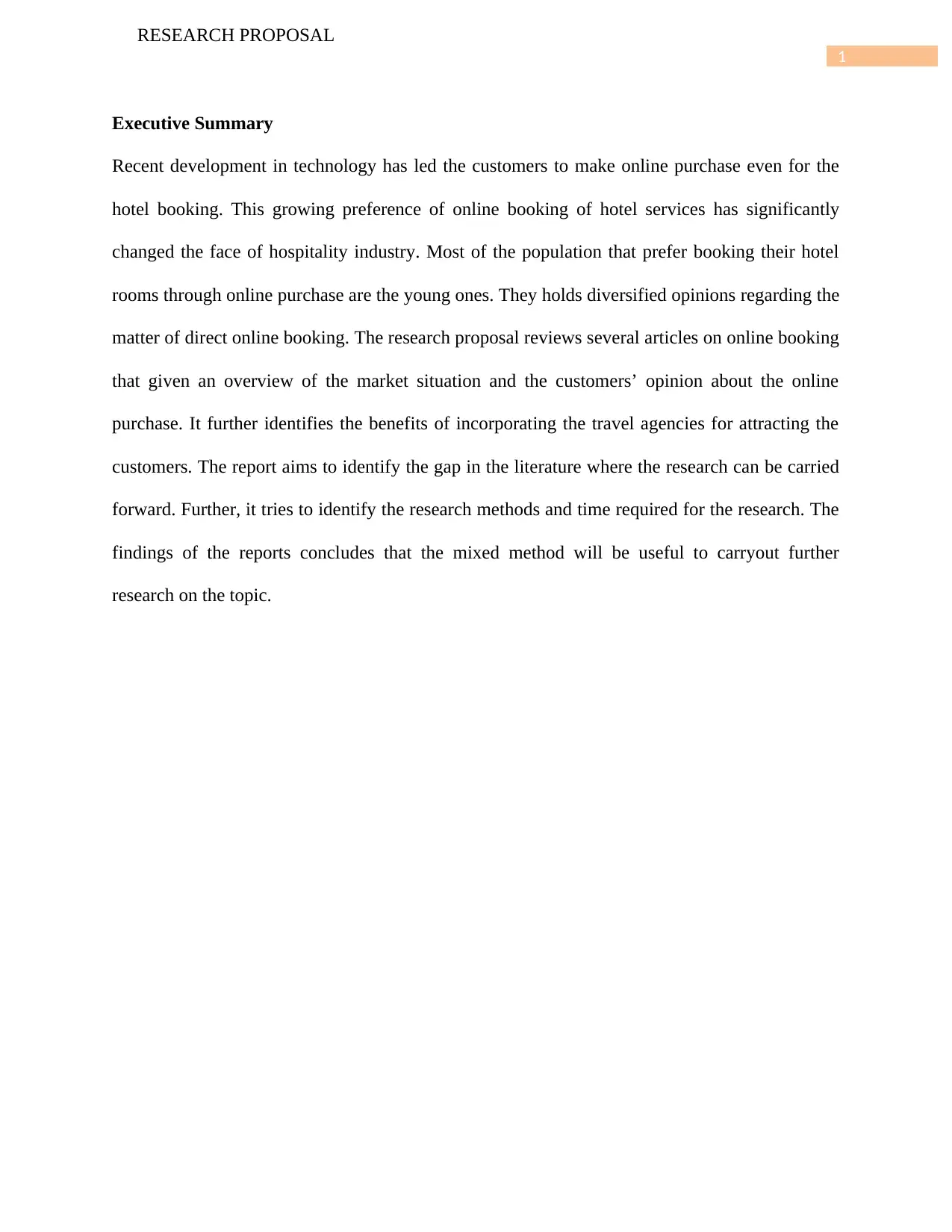
1
RESEARCH PROPOSAL
Executive Summary
Recent development in technology has led the customers to make online purchase even for the
hotel booking. This growing preference of online booking of hotel services has significantly
changed the face of hospitality industry. Most of the population that prefer booking their hotel
rooms through online purchase are the young ones. They holds diversified opinions regarding the
matter of direct online booking. The research proposal reviews several articles on online booking
that given an overview of the market situation and the customers’ opinion about the online
purchase. It further identifies the benefits of incorporating the travel agencies for attracting the
customers. The report aims to identify the gap in the literature where the research can be carried
forward. Further, it tries to identify the research methods and time required for the research. The
findings of the reports concludes that the mixed method will be useful to carryout further
research on the topic.
RESEARCH PROPOSAL
Executive Summary
Recent development in technology has led the customers to make online purchase even for the
hotel booking. This growing preference of online booking of hotel services has significantly
changed the face of hospitality industry. Most of the population that prefer booking their hotel
rooms through online purchase are the young ones. They holds diversified opinions regarding the
matter of direct online booking. The research proposal reviews several articles on online booking
that given an overview of the market situation and the customers’ opinion about the online
purchase. It further identifies the benefits of incorporating the travel agencies for attracting the
customers. The report aims to identify the gap in the literature where the research can be carried
forward. Further, it tries to identify the research methods and time required for the research. The
findings of the reports concludes that the mixed method will be useful to carryout further
research on the topic.
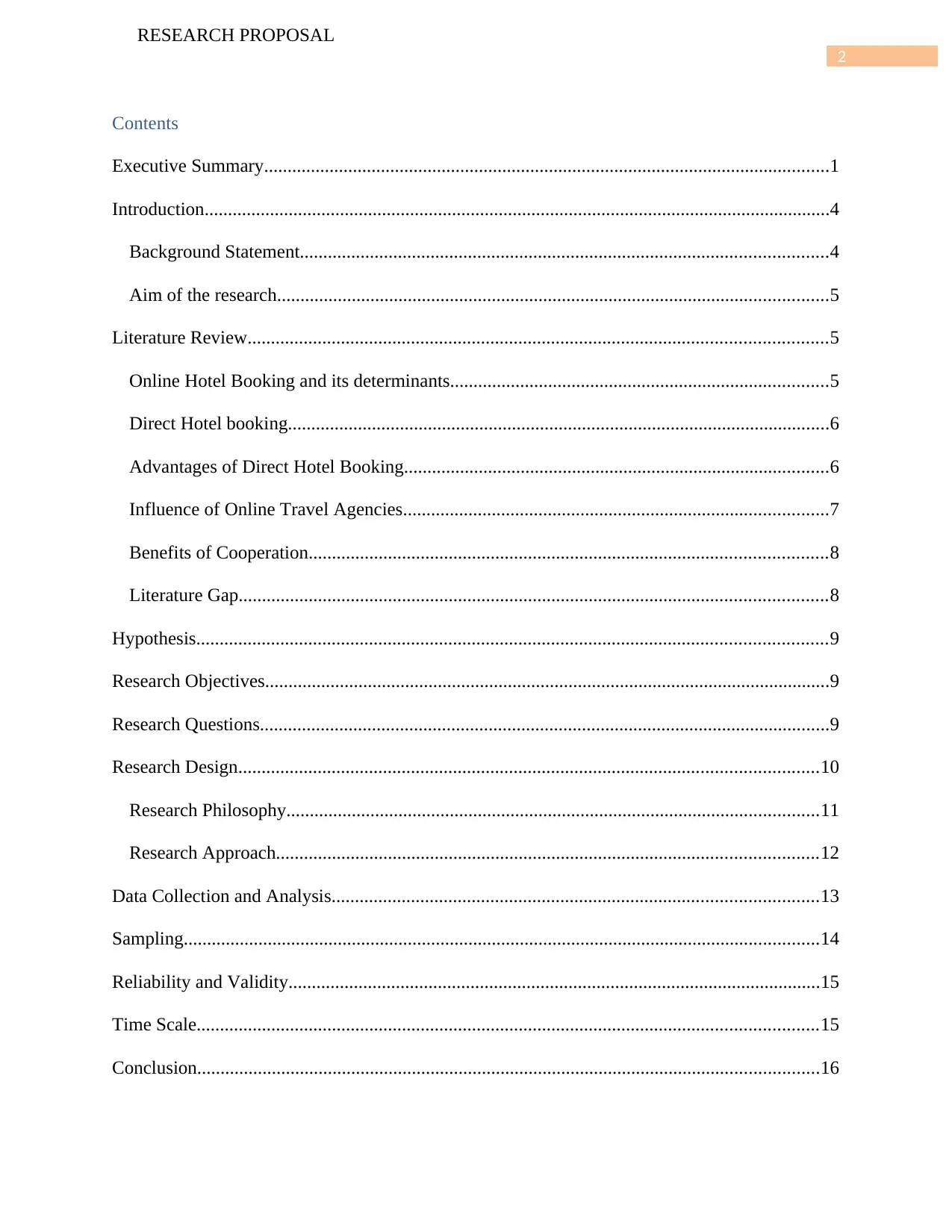
2
RESEARCH PROPOSAL
Contents
Executive Summary.........................................................................................................................1
Introduction......................................................................................................................................4
Background Statement.................................................................................................................4
Aim of the research......................................................................................................................5
Literature Review............................................................................................................................5
Online Hotel Booking and its determinants.................................................................................5
Direct Hotel booking....................................................................................................................6
Advantages of Direct Hotel Booking...........................................................................................6
Influence of Online Travel Agencies...........................................................................................7
Benefits of Cooperation...............................................................................................................8
Literature Gap..............................................................................................................................8
Hypothesis.......................................................................................................................................9
Research Objectives.........................................................................................................................9
Research Questions..........................................................................................................................9
Research Design............................................................................................................................10
Research Philosophy..................................................................................................................11
Research Approach....................................................................................................................12
Data Collection and Analysis........................................................................................................13
Sampling........................................................................................................................................14
Reliability and Validity..................................................................................................................15
Time Scale.....................................................................................................................................15
Conclusion.....................................................................................................................................16
RESEARCH PROPOSAL
Contents
Executive Summary.........................................................................................................................1
Introduction......................................................................................................................................4
Background Statement.................................................................................................................4
Aim of the research......................................................................................................................5
Literature Review............................................................................................................................5
Online Hotel Booking and its determinants.................................................................................5
Direct Hotel booking....................................................................................................................6
Advantages of Direct Hotel Booking...........................................................................................6
Influence of Online Travel Agencies...........................................................................................7
Benefits of Cooperation...............................................................................................................8
Literature Gap..............................................................................................................................8
Hypothesis.......................................................................................................................................9
Research Objectives.........................................................................................................................9
Research Questions..........................................................................................................................9
Research Design............................................................................................................................10
Research Philosophy..................................................................................................................11
Research Approach....................................................................................................................12
Data Collection and Analysis........................................................................................................13
Sampling........................................................................................................................................14
Reliability and Validity..................................................................................................................15
Time Scale.....................................................................................................................................15
Conclusion.....................................................................................................................................16
⊘ This is a preview!⊘
Do you want full access?
Subscribe today to unlock all pages.

Trusted by 1+ million students worldwide
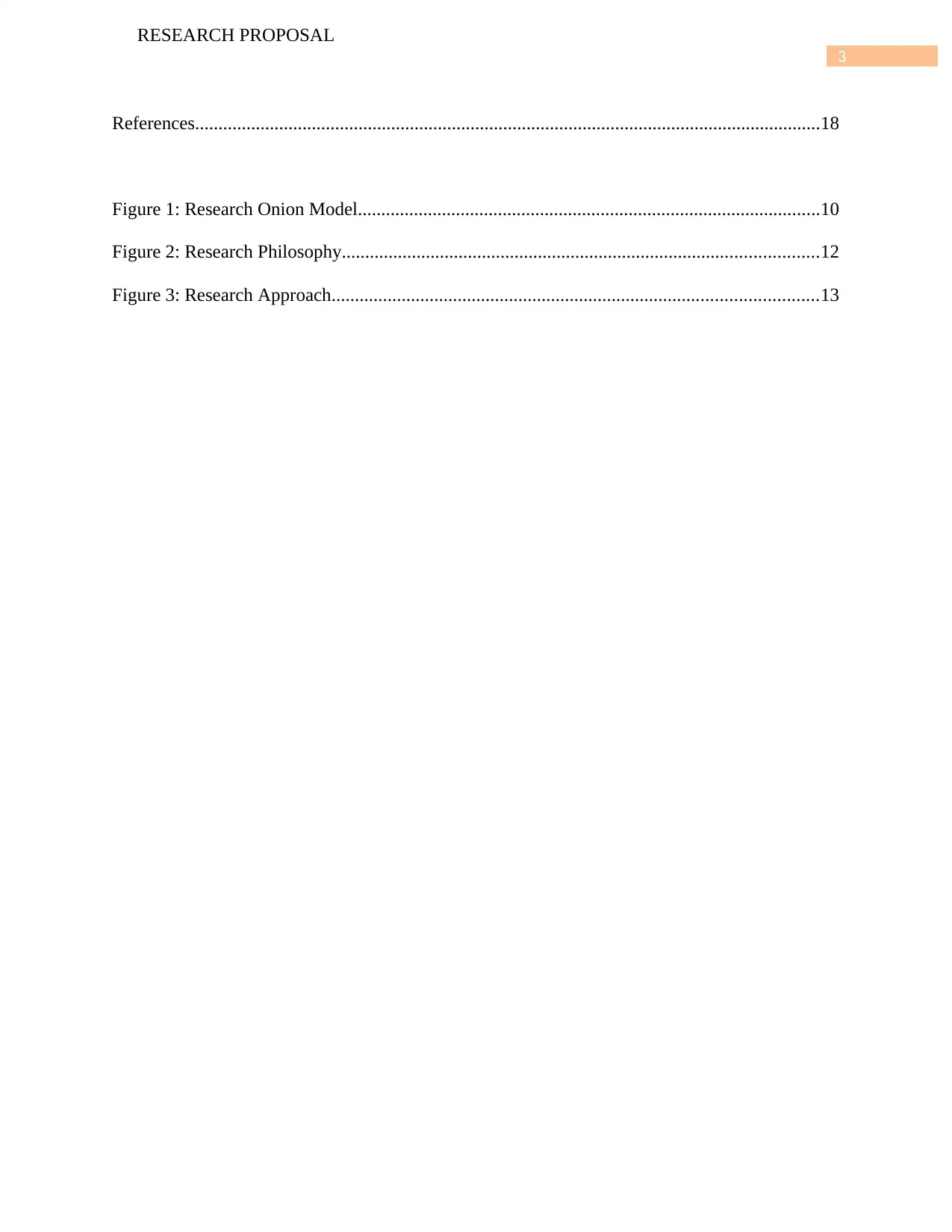
3
RESEARCH PROPOSAL
References......................................................................................................................................18
Figure 1: Research Onion Model...................................................................................................10
Figure 2: Research Philosophy......................................................................................................12
Figure 3: Research Approach........................................................................................................13
RESEARCH PROPOSAL
References......................................................................................................................................18
Figure 1: Research Onion Model...................................................................................................10
Figure 2: Research Philosophy......................................................................................................12
Figure 3: Research Approach........................................................................................................13
Paraphrase This Document
Need a fresh take? Get an instant paraphrase of this document with our AI Paraphraser
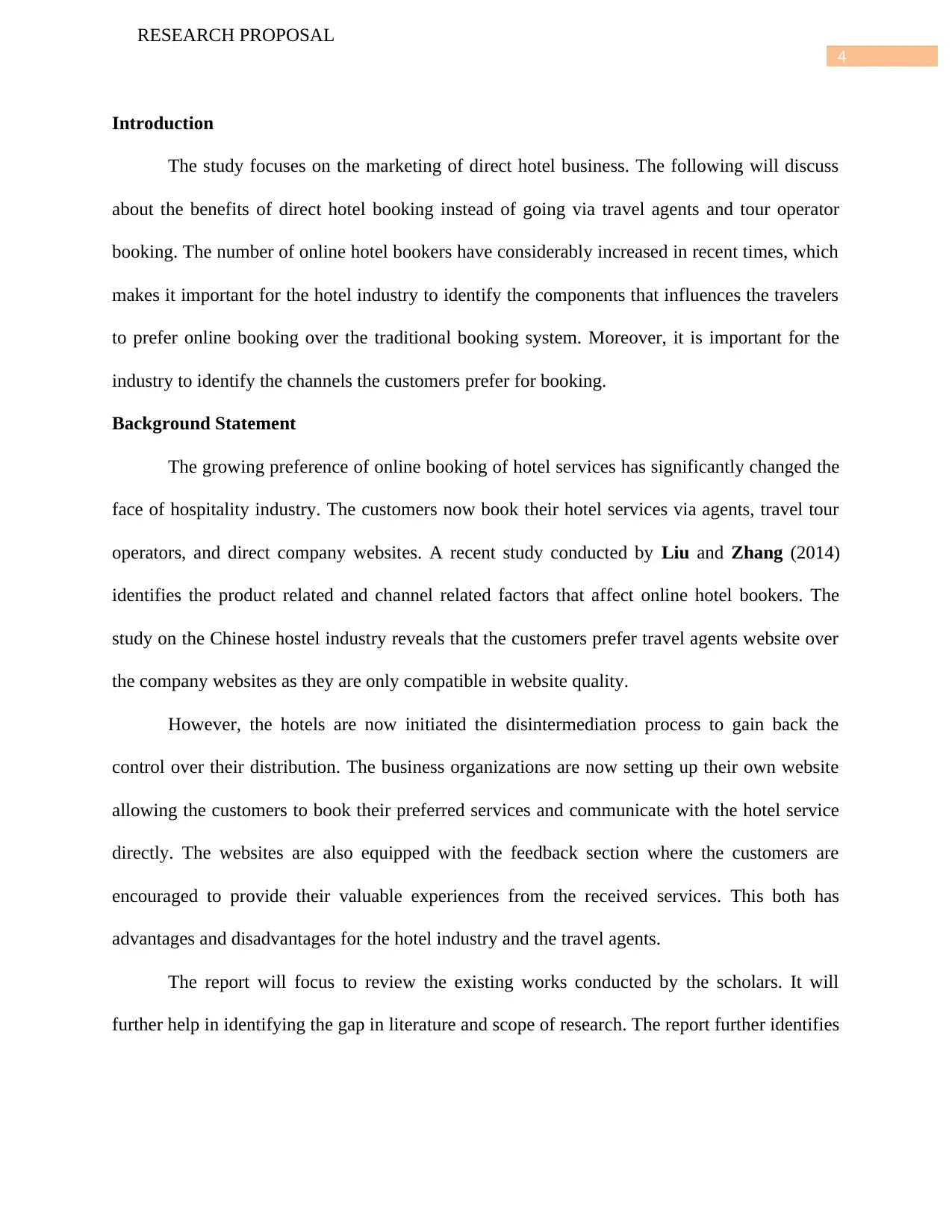
4
RESEARCH PROPOSAL
Introduction
The study focuses on the marketing of direct hotel business. The following will discuss
about the benefits of direct hotel booking instead of going via travel agents and tour operator
booking. The number of online hotel bookers have considerably increased in recent times, which
makes it important for the hotel industry to identify the components that influences the travelers
to prefer online booking over the traditional booking system. Moreover, it is important for the
industry to identify the channels the customers prefer for booking.
Background Statement
The growing preference of online booking of hotel services has significantly changed the
face of hospitality industry. The customers now book their hotel services via agents, travel tour
operators, and direct company websites. A recent study conducted by Liu and Zhang (2014)
identifies the product related and channel related factors that affect online hotel bookers. The
study on the Chinese hostel industry reveals that the customers prefer travel agents website over
the company websites as they are only compatible in website quality.
However, the hotels are now initiated the disintermediation process to gain back the
control over their distribution. The business organizations are now setting up their own website
allowing the customers to book their preferred services and communicate with the hotel service
directly. The websites are also equipped with the feedback section where the customers are
encouraged to provide their valuable experiences from the received services. This both has
advantages and disadvantages for the hotel industry and the travel agents.
The report will focus to review the existing works conducted by the scholars. It will
further help in identifying the gap in literature and scope of research. The report further identifies
RESEARCH PROPOSAL
Introduction
The study focuses on the marketing of direct hotel business. The following will discuss
about the benefits of direct hotel booking instead of going via travel agents and tour operator
booking. The number of online hotel bookers have considerably increased in recent times, which
makes it important for the hotel industry to identify the components that influences the travelers
to prefer online booking over the traditional booking system. Moreover, it is important for the
industry to identify the channels the customers prefer for booking.
Background Statement
The growing preference of online booking of hotel services has significantly changed the
face of hospitality industry. The customers now book their hotel services via agents, travel tour
operators, and direct company websites. A recent study conducted by Liu and Zhang (2014)
identifies the product related and channel related factors that affect online hotel bookers. The
study on the Chinese hostel industry reveals that the customers prefer travel agents website over
the company websites as they are only compatible in website quality.
However, the hotels are now initiated the disintermediation process to gain back the
control over their distribution. The business organizations are now setting up their own website
allowing the customers to book their preferred services and communicate with the hotel service
directly. The websites are also equipped with the feedback section where the customers are
encouraged to provide their valuable experiences from the received services. This both has
advantages and disadvantages for the hotel industry and the travel agents.
The report will focus to review the existing works conducted by the scholars. It will
further help in identifying the gap in literature and scope of research. The report further identifies
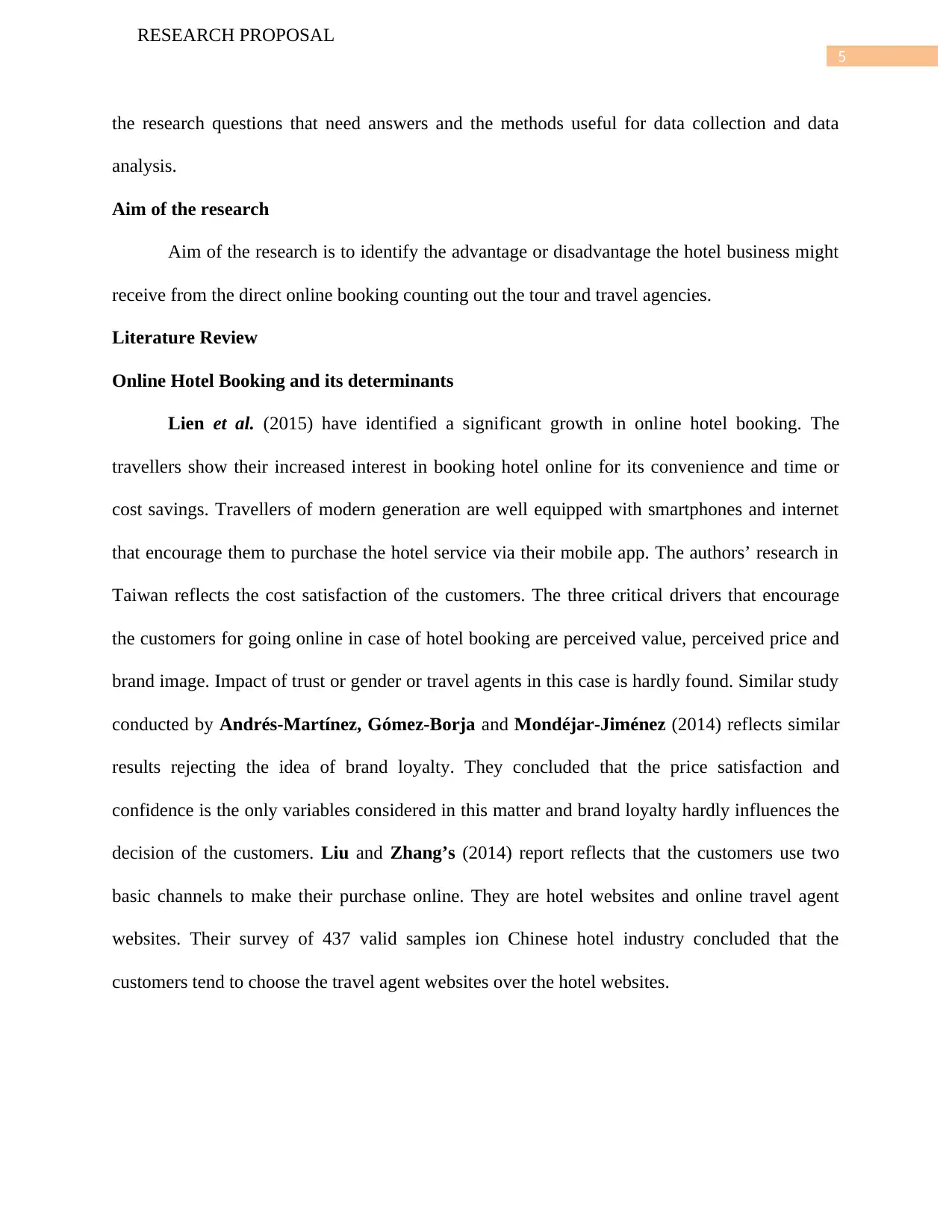
5
RESEARCH PROPOSAL
the research questions that need answers and the methods useful for data collection and data
analysis.
Aim of the research
Aim of the research is to identify the advantage or disadvantage the hotel business might
receive from the direct online booking counting out the tour and travel agencies.
Literature Review
Online Hotel Booking and its determinants
Lien et al. (2015) have identified a significant growth in online hotel booking. The
travellers show their increased interest in booking hotel online for its convenience and time or
cost savings. Travellers of modern generation are well equipped with smartphones and internet
that encourage them to purchase the hotel service via their mobile app. The authors’ research in
Taiwan reflects the cost satisfaction of the customers. The three critical drivers that encourage
the customers for going online in case of hotel booking are perceived value, perceived price and
brand image. Impact of trust or gender or travel agents in this case is hardly found. Similar study
conducted by Andrés-Martínez, Gómez-Borja and Mondéjar-Jiménez (2014) reflects similar
results rejecting the idea of brand loyalty. They concluded that the price satisfaction and
confidence is the only variables considered in this matter and brand loyalty hardly influences the
decision of the customers. Liu and Zhang’s (2014) report reflects that the customers use two
basic channels to make their purchase online. They are hotel websites and online travel agent
websites. Their survey of 437 valid samples ion Chinese hotel industry concluded that the
customers tend to choose the travel agent websites over the hotel websites.
RESEARCH PROPOSAL
the research questions that need answers and the methods useful for data collection and data
analysis.
Aim of the research
Aim of the research is to identify the advantage or disadvantage the hotel business might
receive from the direct online booking counting out the tour and travel agencies.
Literature Review
Online Hotel Booking and its determinants
Lien et al. (2015) have identified a significant growth in online hotel booking. The
travellers show their increased interest in booking hotel online for its convenience and time or
cost savings. Travellers of modern generation are well equipped with smartphones and internet
that encourage them to purchase the hotel service via their mobile app. The authors’ research in
Taiwan reflects the cost satisfaction of the customers. The three critical drivers that encourage
the customers for going online in case of hotel booking are perceived value, perceived price and
brand image. Impact of trust or gender or travel agents in this case is hardly found. Similar study
conducted by Andrés-Martínez, Gómez-Borja and Mondéjar-Jiménez (2014) reflects similar
results rejecting the idea of brand loyalty. They concluded that the price satisfaction and
confidence is the only variables considered in this matter and brand loyalty hardly influences the
decision of the customers. Liu and Zhang’s (2014) report reflects that the customers use two
basic channels to make their purchase online. They are hotel websites and online travel agent
websites. Their survey of 437 valid samples ion Chinese hotel industry concluded that the
customers tend to choose the travel agent websites over the hotel websites.
⊘ This is a preview!⊘
Do you want full access?
Subscribe today to unlock all pages.

Trusted by 1+ million students worldwide
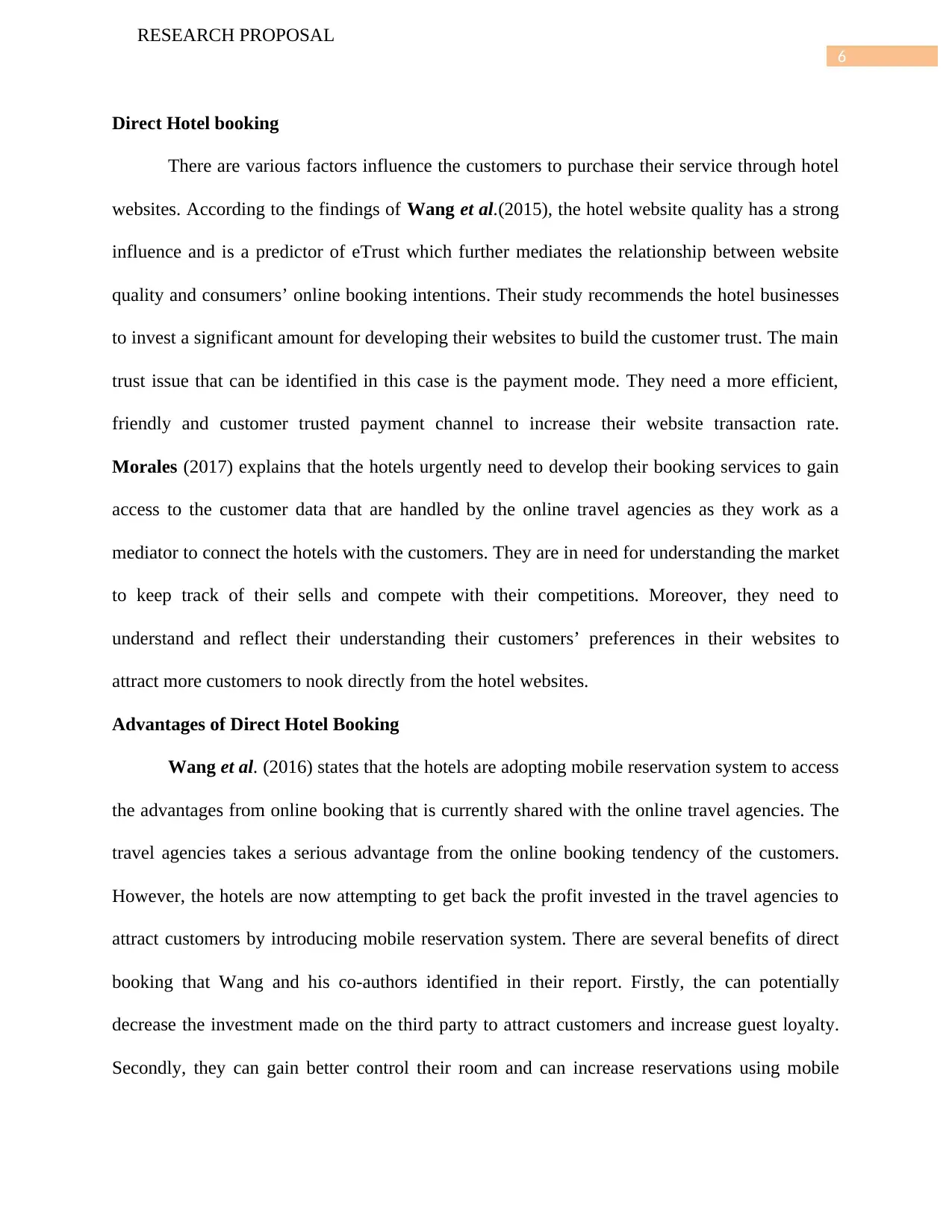
6
RESEARCH PROPOSAL
Direct Hotel booking
There are various factors influence the customers to purchase their service through hotel
websites. According to the findings of Wang et al.(2015), the hotel website quality has a strong
influence and is a predictor of eTrust which further mediates the relationship between website
quality and consumers’ online booking intentions. Their study recommends the hotel businesses
to invest a significant amount for developing their websites to build the customer trust. The main
trust issue that can be identified in this case is the payment mode. They need a more efficient,
friendly and customer trusted payment channel to increase their website transaction rate.
Morales (2017) explains that the hotels urgently need to develop their booking services to gain
access to the customer data that are handled by the online travel agencies as they work as a
mediator to connect the hotels with the customers. They are in need for understanding the market
to keep track of their sells and compete with their competitions. Moreover, they need to
understand and reflect their understanding their customers’ preferences in their websites to
attract more customers to nook directly from the hotel websites.
Advantages of Direct Hotel Booking
Wang et al. (2016) states that the hotels are adopting mobile reservation system to access
the advantages from online booking that is currently shared with the online travel agencies. The
travel agencies takes a serious advantage from the online booking tendency of the customers.
However, the hotels are now attempting to get back the profit invested in the travel agencies to
attract customers by introducing mobile reservation system. There are several benefits of direct
booking that Wang and his co-authors identified in their report. Firstly, the can potentially
decrease the investment made on the third party to attract customers and increase guest loyalty.
Secondly, they can gain better control their room and can increase reservations using mobile
RESEARCH PROPOSAL
Direct Hotel booking
There are various factors influence the customers to purchase their service through hotel
websites. According to the findings of Wang et al.(2015), the hotel website quality has a strong
influence and is a predictor of eTrust which further mediates the relationship between website
quality and consumers’ online booking intentions. Their study recommends the hotel businesses
to invest a significant amount for developing their websites to build the customer trust. The main
trust issue that can be identified in this case is the payment mode. They need a more efficient,
friendly and customer trusted payment channel to increase their website transaction rate.
Morales (2017) explains that the hotels urgently need to develop their booking services to gain
access to the customer data that are handled by the online travel agencies as they work as a
mediator to connect the hotels with the customers. They are in need for understanding the market
to keep track of their sells and compete with their competitions. Moreover, they need to
understand and reflect their understanding their customers’ preferences in their websites to
attract more customers to nook directly from the hotel websites.
Advantages of Direct Hotel Booking
Wang et al. (2016) states that the hotels are adopting mobile reservation system to access
the advantages from online booking that is currently shared with the online travel agencies. The
travel agencies takes a serious advantage from the online booking tendency of the customers.
However, the hotels are now attempting to get back the profit invested in the travel agencies to
attract customers by introducing mobile reservation system. There are several benefits of direct
booking that Wang and his co-authors identified in their report. Firstly, the can potentially
decrease the investment made on the third party to attract customers and increase guest loyalty.
Secondly, they can gain better control their room and can increase reservations using mobile
Paraphrase This Document
Need a fresh take? Get an instant paraphrase of this document with our AI Paraphraser
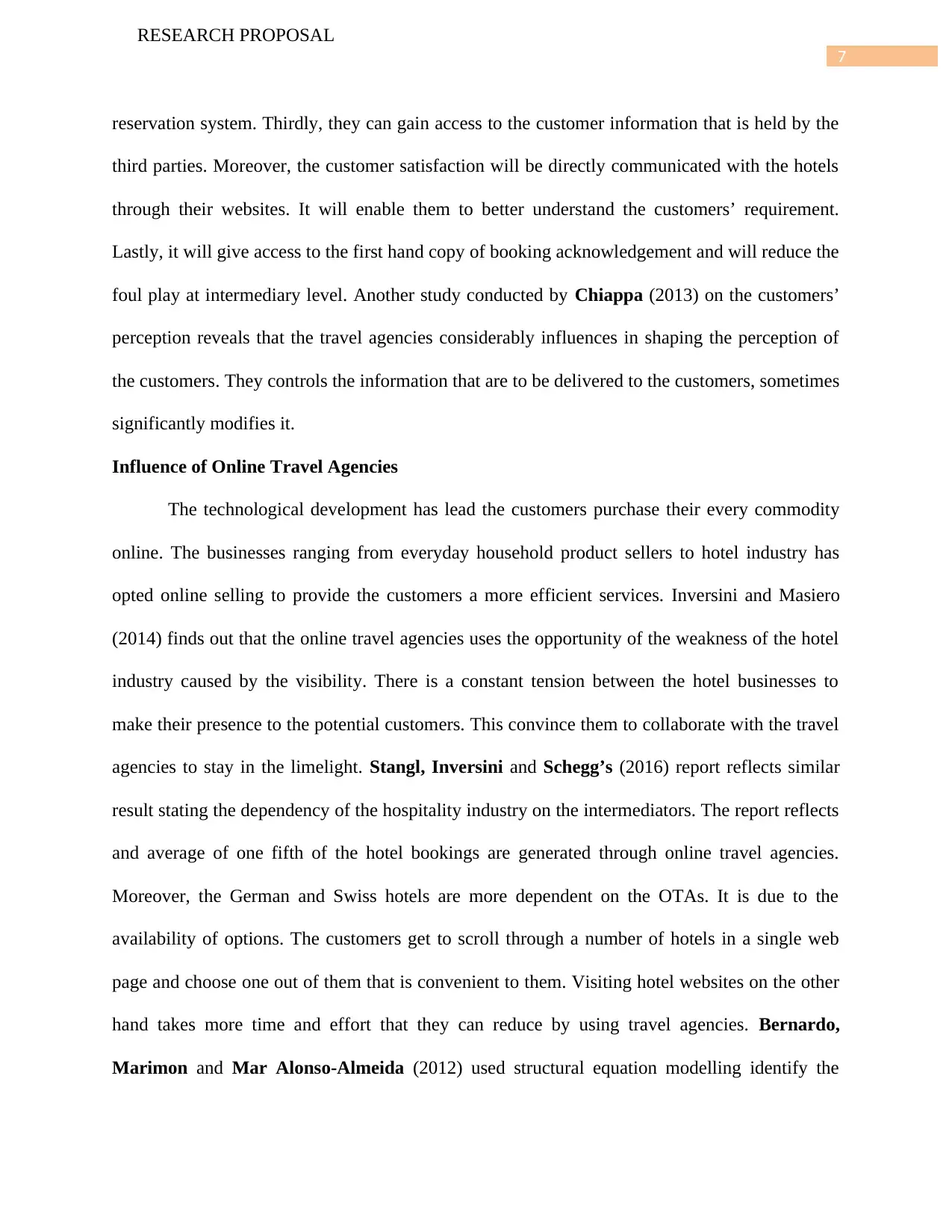
7
RESEARCH PROPOSAL
reservation system. Thirdly, they can gain access to the customer information that is held by the
third parties. Moreover, the customer satisfaction will be directly communicated with the hotels
through their websites. It will enable them to better understand the customers’ requirement.
Lastly, it will give access to the first hand copy of booking acknowledgement and will reduce the
foul play at intermediary level. Another study conducted by Chiappa (2013) on the customers’
perception reveals that the travel agencies considerably influences in shaping the perception of
the customers. They controls the information that are to be delivered to the customers, sometimes
significantly modifies it.
Influence of Online Travel Agencies
The technological development has lead the customers purchase their every commodity
online. The businesses ranging from everyday household product sellers to hotel industry has
opted online selling to provide the customers a more efficient services. Inversini and Masiero
(2014) finds out that the online travel agencies uses the opportunity of the weakness of the hotel
industry caused by the visibility. There is a constant tension between the hotel businesses to
make their presence to the potential customers. This convince them to collaborate with the travel
agencies to stay in the limelight. Stangl, Inversini and Schegg’s (2016) report reflects similar
result stating the dependency of the hospitality industry on the intermediators. The report reflects
and average of one fifth of the hotel bookings are generated through online travel agencies.
Moreover, the German and Swiss hotels are more dependent on the OTAs. It is due to the
availability of options. The customers get to scroll through a number of hotels in a single web
page and choose one out of them that is convenient to them. Visiting hotel websites on the other
hand takes more time and effort that they can reduce by using travel agencies. Bernardo,
Marimon and Mar Alonso-Almeida (2012) used structural equation modelling identify the
RESEARCH PROPOSAL
reservation system. Thirdly, they can gain access to the customer information that is held by the
third parties. Moreover, the customer satisfaction will be directly communicated with the hotels
through their websites. It will enable them to better understand the customers’ requirement.
Lastly, it will give access to the first hand copy of booking acknowledgement and will reduce the
foul play at intermediary level. Another study conducted by Chiappa (2013) on the customers’
perception reveals that the travel agencies considerably influences in shaping the perception of
the customers. They controls the information that are to be delivered to the customers, sometimes
significantly modifies it.
Influence of Online Travel Agencies
The technological development has lead the customers purchase their every commodity
online. The businesses ranging from everyday household product sellers to hotel industry has
opted online selling to provide the customers a more efficient services. Inversini and Masiero
(2014) finds out that the online travel agencies uses the opportunity of the weakness of the hotel
industry caused by the visibility. There is a constant tension between the hotel businesses to
make their presence to the potential customers. This convince them to collaborate with the travel
agencies to stay in the limelight. Stangl, Inversini and Schegg’s (2016) report reflects similar
result stating the dependency of the hospitality industry on the intermediators. The report reflects
and average of one fifth of the hotel bookings are generated through online travel agencies.
Moreover, the German and Swiss hotels are more dependent on the OTAs. It is due to the
availability of options. The customers get to scroll through a number of hotels in a single web
page and choose one out of them that is convenient to them. Visiting hotel websites on the other
hand takes more time and effort that they can reduce by using travel agencies. Bernardo,
Marimon and Mar Alonso-Almeida (2012) used structural equation modelling identify the
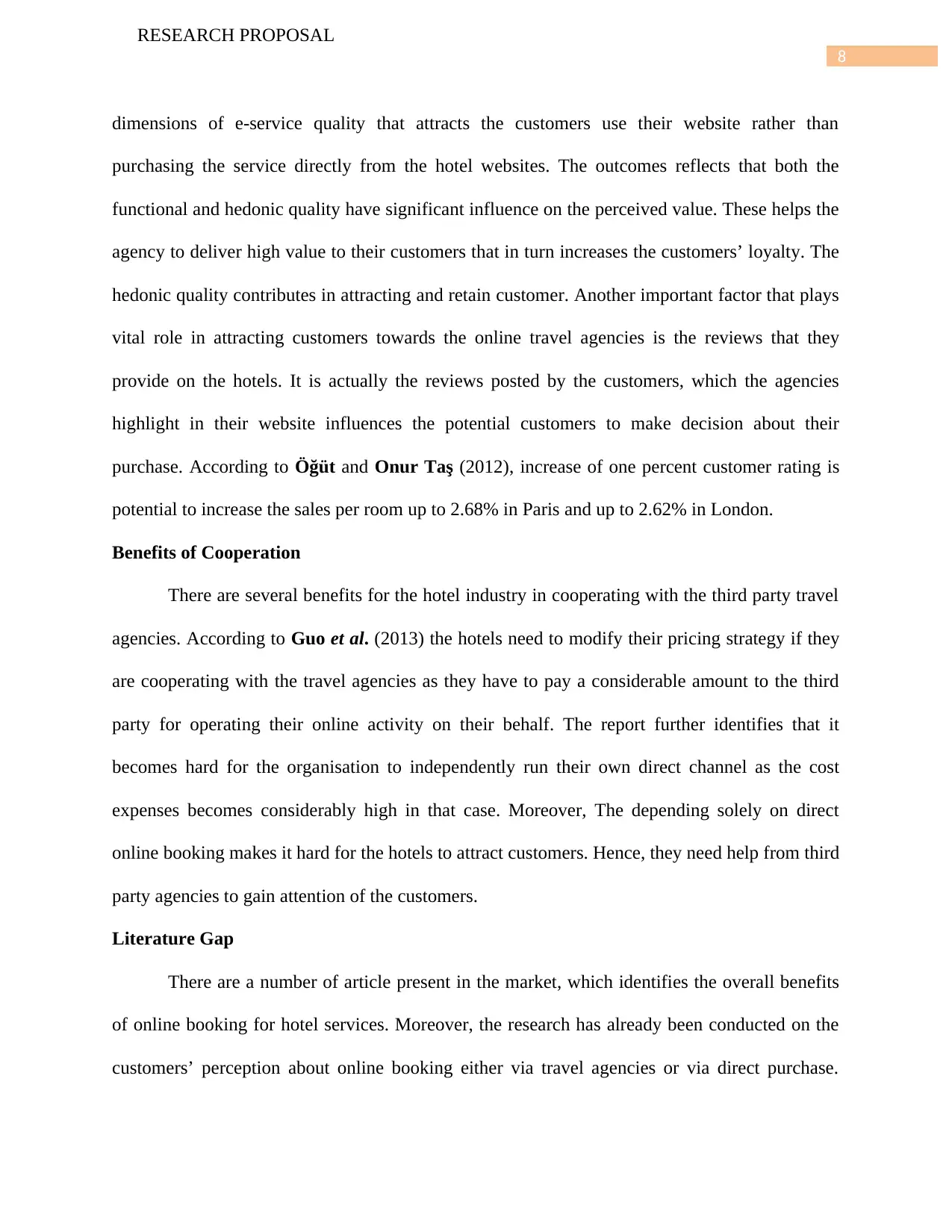
8
RESEARCH PROPOSAL
dimensions of e-service quality that attracts the customers use their website rather than
purchasing the service directly from the hotel websites. The outcomes reflects that both the
functional and hedonic quality have significant influence on the perceived value. These helps the
agency to deliver high value to their customers that in turn increases the customers’ loyalty. The
hedonic quality contributes in attracting and retain customer. Another important factor that plays
vital role in attracting customers towards the online travel agencies is the reviews that they
provide on the hotels. It is actually the reviews posted by the customers, which the agencies
highlight in their website influences the potential customers to make decision about their
purchase. According to Öğüt and Onur Taş (2012), increase of one percent customer rating is
potential to increase the sales per room up to 2.68% in Paris and up to 2.62% in London.
Benefits of Cooperation
There are several benefits for the hotel industry in cooperating with the third party travel
agencies. According to Guo et al. (2013) the hotels need to modify their pricing strategy if they
are cooperating with the travel agencies as they have to pay a considerable amount to the third
party for operating their online activity on their behalf. The report further identifies that it
becomes hard for the organisation to independently run their own direct channel as the cost
expenses becomes considerably high in that case. Moreover, The depending solely on direct
online booking makes it hard for the hotels to attract customers. Hence, they need help from third
party agencies to gain attention of the customers.
Literature Gap
There are a number of article present in the market, which identifies the overall benefits
of online booking for hotel services. Moreover, the research has already been conducted on the
customers’ perception about online booking either via travel agencies or via direct purchase.
RESEARCH PROPOSAL
dimensions of e-service quality that attracts the customers use their website rather than
purchasing the service directly from the hotel websites. The outcomes reflects that both the
functional and hedonic quality have significant influence on the perceived value. These helps the
agency to deliver high value to their customers that in turn increases the customers’ loyalty. The
hedonic quality contributes in attracting and retain customer. Another important factor that plays
vital role in attracting customers towards the online travel agencies is the reviews that they
provide on the hotels. It is actually the reviews posted by the customers, which the agencies
highlight in their website influences the potential customers to make decision about their
purchase. According to Öğüt and Onur Taş (2012), increase of one percent customer rating is
potential to increase the sales per room up to 2.68% in Paris and up to 2.62% in London.
Benefits of Cooperation
There are several benefits for the hotel industry in cooperating with the third party travel
agencies. According to Guo et al. (2013) the hotels need to modify their pricing strategy if they
are cooperating with the travel agencies as they have to pay a considerable amount to the third
party for operating their online activity on their behalf. The report further identifies that it
becomes hard for the organisation to independently run their own direct channel as the cost
expenses becomes considerably high in that case. Moreover, The depending solely on direct
online booking makes it hard for the hotels to attract customers. Hence, they need help from third
party agencies to gain attention of the customers.
Literature Gap
There are a number of article present in the market, which identifies the overall benefits
of online booking for hotel services. Moreover, the research has already been conducted on the
customers’ perception about online booking either via travel agencies or via direct purchase.
⊘ This is a preview!⊘
Do you want full access?
Subscribe today to unlock all pages.

Trusted by 1+ million students worldwide
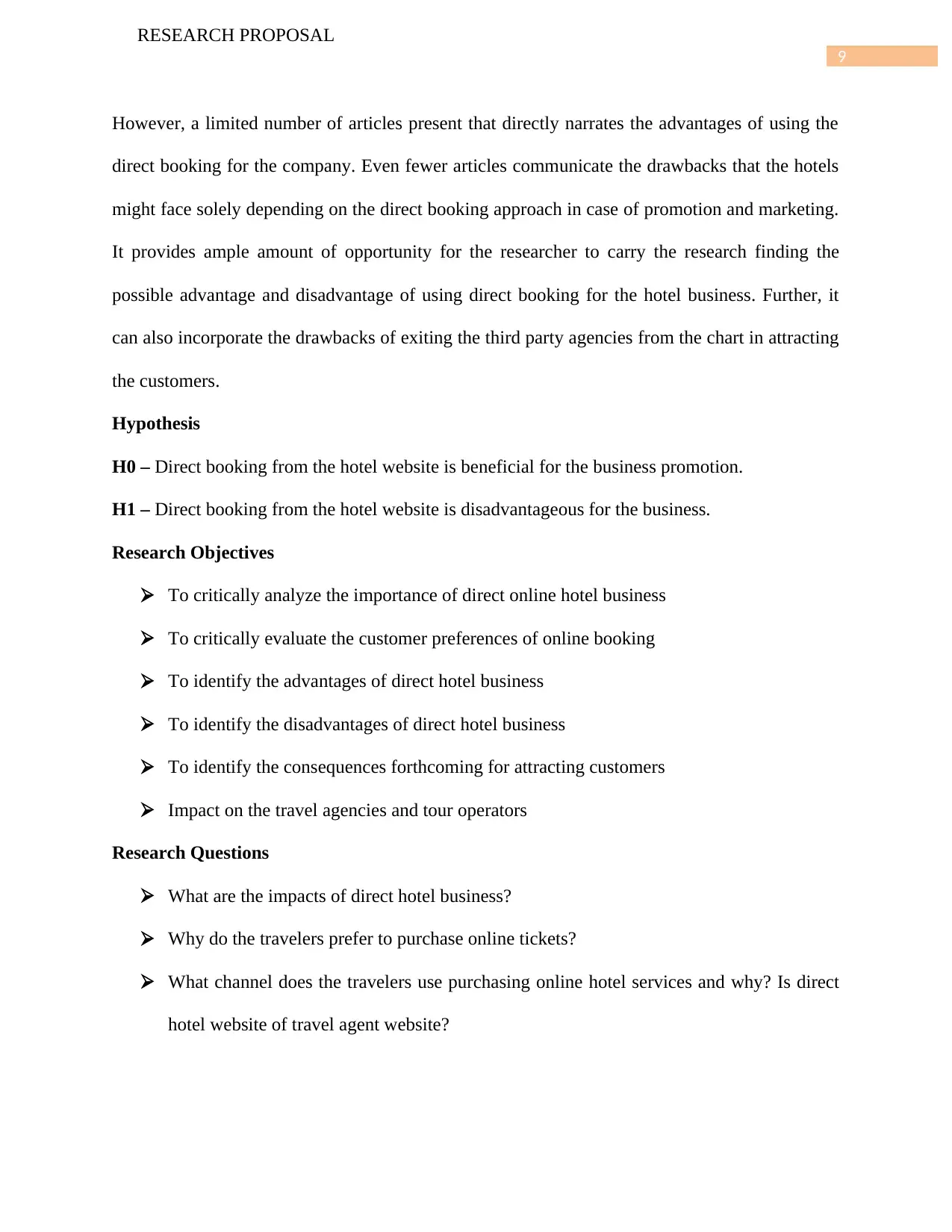
9
RESEARCH PROPOSAL
However, a limited number of articles present that directly narrates the advantages of using the
direct booking for the company. Even fewer articles communicate the drawbacks that the hotels
might face solely depending on the direct booking approach in case of promotion and marketing.
It provides ample amount of opportunity for the researcher to carry the research finding the
possible advantage and disadvantage of using direct booking for the hotel business. Further, it
can also incorporate the drawbacks of exiting the third party agencies from the chart in attracting
the customers.
Hypothesis
H0 – Direct booking from the hotel website is beneficial for the business promotion.
H1 – Direct booking from the hotel website is disadvantageous for the business.
Research Objectives
To critically analyze the importance of direct online hotel business
To critically evaluate the customer preferences of online booking
To identify the advantages of direct hotel business
To identify the disadvantages of direct hotel business
To identify the consequences forthcoming for attracting customers
Impact on the travel agencies and tour operators
Research Questions
What are the impacts of direct hotel business?
Why do the travelers prefer to purchase online tickets?
What channel does the travelers use purchasing online hotel services and why? Is direct
hotel website of travel agent website?
RESEARCH PROPOSAL
However, a limited number of articles present that directly narrates the advantages of using the
direct booking for the company. Even fewer articles communicate the drawbacks that the hotels
might face solely depending on the direct booking approach in case of promotion and marketing.
It provides ample amount of opportunity for the researcher to carry the research finding the
possible advantage and disadvantage of using direct booking for the hotel business. Further, it
can also incorporate the drawbacks of exiting the third party agencies from the chart in attracting
the customers.
Hypothesis
H0 – Direct booking from the hotel website is beneficial for the business promotion.
H1 – Direct booking from the hotel website is disadvantageous for the business.
Research Objectives
To critically analyze the importance of direct online hotel business
To critically evaluate the customer preferences of online booking
To identify the advantages of direct hotel business
To identify the disadvantages of direct hotel business
To identify the consequences forthcoming for attracting customers
Impact on the travel agencies and tour operators
Research Questions
What are the impacts of direct hotel business?
Why do the travelers prefer to purchase online tickets?
What channel does the travelers use purchasing online hotel services and why? Is direct
hotel website of travel agent website?
Paraphrase This Document
Need a fresh take? Get an instant paraphrase of this document with our AI Paraphraser
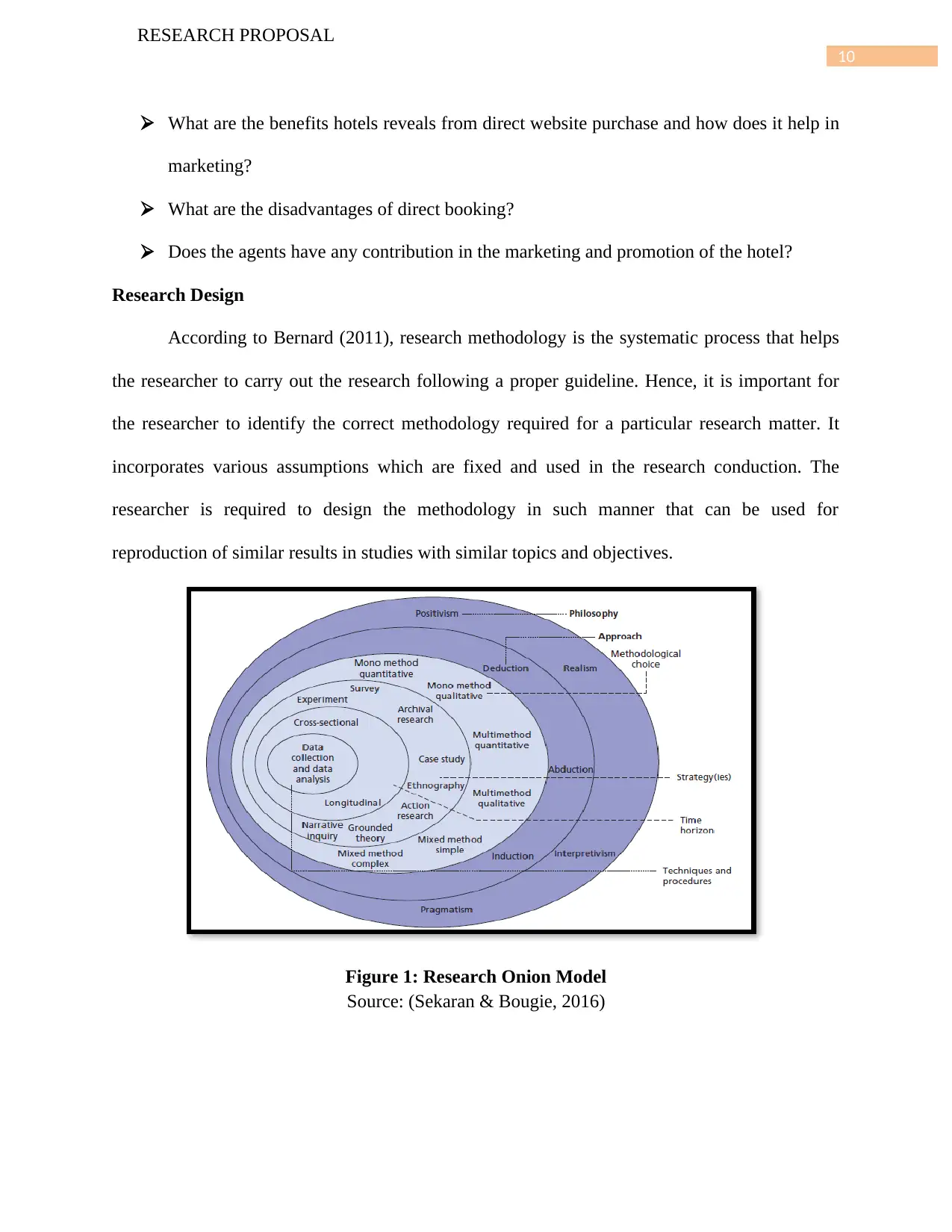
10
RESEARCH PROPOSAL
What are the benefits hotels reveals from direct website purchase and how does it help in
marketing?
What are the disadvantages of direct booking?
Does the agents have any contribution in the marketing and promotion of the hotel?
Research Design
According to Bernard (2011), research methodology is the systematic process that helps
the researcher to carry out the research following a proper guideline. Hence, it is important for
the researcher to identify the correct methodology required for a particular research matter. It
incorporates various assumptions which are fixed and used in the research conduction. The
researcher is required to design the methodology in such manner that can be used for
reproduction of similar results in studies with similar topics and objectives.
Figure 1: Research Onion Model
Source: (Sekaran & Bougie, 2016)
RESEARCH PROPOSAL
What are the benefits hotels reveals from direct website purchase and how does it help in
marketing?
What are the disadvantages of direct booking?
Does the agents have any contribution in the marketing and promotion of the hotel?
Research Design
According to Bernard (2011), research methodology is the systematic process that helps
the researcher to carry out the research following a proper guideline. Hence, it is important for
the researcher to identify the correct methodology required for a particular research matter. It
incorporates various assumptions which are fixed and used in the research conduction. The
researcher is required to design the methodology in such manner that can be used for
reproduction of similar results in studies with similar topics and objectives.
Figure 1: Research Onion Model
Source: (Sekaran & Bougie, 2016)
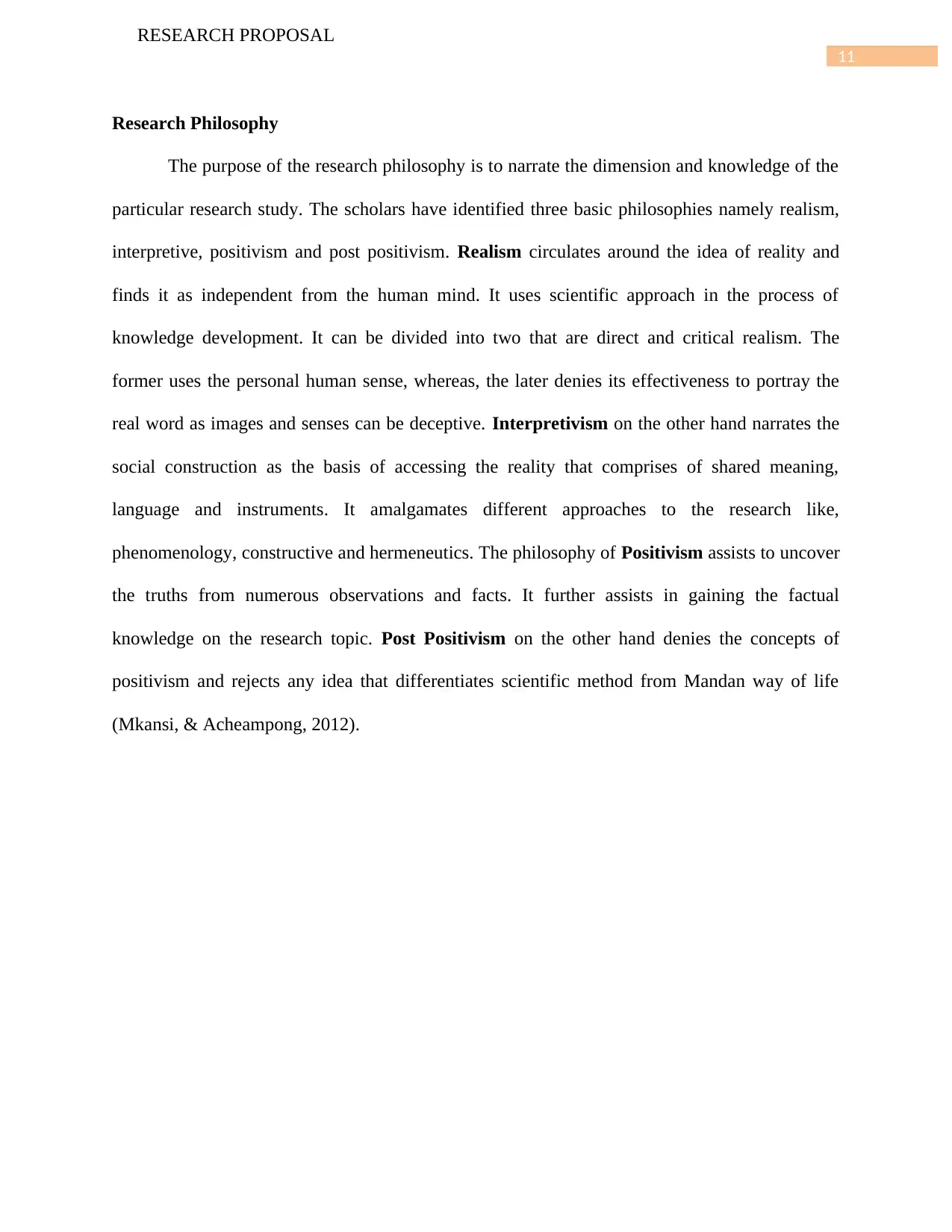
11
RESEARCH PROPOSAL
Research Philosophy
The purpose of the research philosophy is to narrate the dimension and knowledge of the
particular research study. The scholars have identified three basic philosophies namely realism,
interpretive, positivism and post positivism. Realism circulates around the idea of reality and
finds it as independent from the human mind. It uses scientific approach in the process of
knowledge development. It can be divided into two that are direct and critical realism. The
former uses the personal human sense, whereas, the later denies its effectiveness to portray the
real word as images and senses can be deceptive. Interpretivism on the other hand narrates the
social construction as the basis of accessing the reality that comprises of shared meaning,
language and instruments. It amalgamates different approaches to the research like,
phenomenology, constructive and hermeneutics. The philosophy of Positivism assists to uncover
the truths from numerous observations and facts. It further assists in gaining the factual
knowledge on the research topic. Post Positivism on the other hand denies the concepts of
positivism and rejects any idea that differentiates scientific method from Mandan way of life
(Mkansi, & Acheampong, 2012).
RESEARCH PROPOSAL
Research Philosophy
The purpose of the research philosophy is to narrate the dimension and knowledge of the
particular research study. The scholars have identified three basic philosophies namely realism,
interpretive, positivism and post positivism. Realism circulates around the idea of reality and
finds it as independent from the human mind. It uses scientific approach in the process of
knowledge development. It can be divided into two that are direct and critical realism. The
former uses the personal human sense, whereas, the later denies its effectiveness to portray the
real word as images and senses can be deceptive. Interpretivism on the other hand narrates the
social construction as the basis of accessing the reality that comprises of shared meaning,
language and instruments. It amalgamates different approaches to the research like,
phenomenology, constructive and hermeneutics. The philosophy of Positivism assists to uncover
the truths from numerous observations and facts. It further assists in gaining the factual
knowledge on the research topic. Post Positivism on the other hand denies the concepts of
positivism and rejects any idea that differentiates scientific method from Mandan way of life
(Mkansi, & Acheampong, 2012).
⊘ This is a preview!⊘
Do you want full access?
Subscribe today to unlock all pages.

Trusted by 1+ million students worldwide
1 out of 21
Related Documents
Your All-in-One AI-Powered Toolkit for Academic Success.
+13062052269
info@desklib.com
Available 24*7 on WhatsApp / Email
![[object Object]](/_next/static/media/star-bottom.7253800d.svg)
Unlock your academic potential
Copyright © 2020–2026 A2Z Services. All Rights Reserved. Developed and managed by ZUCOL.




